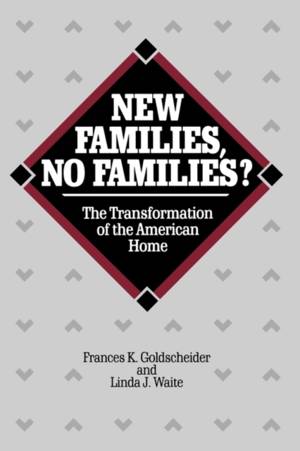
Je cadeautjes zeker op tijd in huis hebben voor de feestdagen? Kom langs in onze winkels en vind het perfecte geschenk!
- Afhalen na 1 uur in een winkel met voorraad
- Gratis thuislevering in België vanaf € 30
- Ruim aanbod met 7 miljoen producten
Je cadeautjes zeker op tijd in huis hebben voor de feestdagen? Kom langs in onze winkels en vind het perfecte geschenk!
- Afhalen na 1 uur in een winkel met voorraad
- Gratis thuislevering in België vanaf € 30
- Ruim aanbod met 7 miljoen producten
Zoeken
New Families, No Families?
The Transformation of the American Home Volume 6
Frances K Goldscheider, Linda J Waite
€ 54,45
+ 108 punten
Omschrijving
Is the American family a thing of the past? Almost anyone can tell a story that illustrates how dramatically things have changed in the past decades. Nonmarriage, childlessness and divorce are commonplace. Most children leave their parents' home and live for increasing periods before marriage as independent adults. But there are also signs of strengths. Some parents play more equal roles, both financially and in coping with household tasks. In this revealing new study, Frances Goldscheider and Linda Waite discuss cogently the question of whether we are headed for no families, or new families.
Adults across the nation who reached "thirtysomething" in the early 1980s are the primary focus of the book, although broader patterns of social change are seen in the influence of their parents' experiences on them and in their own children's experiences of family life. The authors begin with their subjects as very young adults, examining their plans for work and family and their attitudes toward women's work and family roles. As these young men and women move farther into adulthood, we learn what influences their chances of marriage, their patterns of family building (and dissolving), and the division of labor in the families they form. In each case the authors focus on the effects of exposure to different family structures in childhood and young adulthood. The authors find, surprisingly, that the real threats to the family are in the home itself: the new option of "a home of one's own" in a variety of circumstances outside of marriage, most men's noninvolvement in the home and its tasks, and the fact that knowledge of and respect for basic skills involved in making a home are not being taught to today's sons and daughters.
Adults across the nation who reached "thirtysomething" in the early 1980s are the primary focus of the book, although broader patterns of social change are seen in the influence of their parents' experiences on them and in their own children's experiences of family life. The authors begin with their subjects as very young adults, examining their plans for work and family and their attitudes toward women's work and family roles. As these young men and women move farther into adulthood, we learn what influences their chances of marriage, their patterns of family building (and dissolving), and the division of labor in the families they form. In each case the authors focus on the effects of exposure to different family structures in childhood and young adulthood. The authors find, surprisingly, that the real threats to the family are in the home itself: the new option of "a home of one's own" in a variety of circumstances outside of marriage, most men's noninvolvement in the home and its tasks, and the fact that knowledge of and respect for basic skills involved in making a home are not being taught to today's sons and daughters.
Specificaties
Betrokkenen
- Auteur(s):
- Uitgeverij:
Inhoud
- Aantal bladzijden:
- 356
- Taal:
- Engels
- Reeks:
- Reeksnummer:
- nr. 6
Eigenschappen
- Productcode (EAN):
- 9780520083059
- Verschijningsdatum:
- 18/08/1993
- Uitvoering:
- Paperback
- Formaat:
- Trade paperback (VS)
- Afmetingen:
- 153 mm x 228 mm
- Gewicht:
- 430 g

Alleen bij Standaard Boekhandel
+ 108 punten op je klantenkaart van Standaard Boekhandel
Beoordelingen
We publiceren alleen reviews die voldoen aan de voorwaarden voor reviews. Bekijk onze voorwaarden voor reviews.









